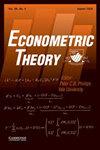频谱金融计量经济学
IF 1
4区 经济学
Q3 ECONOMICS
引用次数: 1
摘要
我们回顾了有关谱回归估计的文献。我们提出了一个内聚框架,旨在对经济时间序列对解释变量变化的响应中频率的依赖进行建模。我们的重点是统计结构和时域规范的经济解释,这些规范需要在频率上、在尺度上或在聚合上获得视界效应。为此,我们阐明了我们关于先行滞后效应在解释变量中作为跨视界差异信息驱动因素所起作用的讨论。我们为未来的工作提供了视角。本文章由计算机程序翻译,如有差异,请以英文原文为准。
SPECTRAL FINANCIAL ECONOMETRICS
We survey the literature on spectral regression estimation. We present a cohesive framework designed to model dependence on frequency in the response of economic time series to changes in the explanatory variables. Our emphasis is on the statistical structure and on the economic interpretation of time-domain specifications needed to obtain horizon effects over frequencies, over scales, or upon aggregation. To this end, we articulate our discussion around the role played by lead-lag effects in the explanatory variables as drivers of differential information across horizons. We provide perspectives for future work throughout.
求助全文
通过发布文献求助,成功后即可免费获取论文全文。
去求助
来源期刊

Econometric Theory
MATHEMATICS, INTERDISCIPLINARY APPLICATIONS-STATISTICS & PROBABILITY
CiteScore
1.90
自引率
0.00%
发文量
52
审稿时长
>12 weeks
期刊介绍:
Since its inception, Econometric Theory has aimed to endow econometrics with an innovative journal dedicated to advance theoretical research in econometrics. It provides a centralized professional outlet for original theoretical contributions in all of the major areas of econometrics, and all fields of research in econometric theory fall within the scope of ET. In addition, ET fosters the multidisciplinary features of econometrics that extend beyond economics. Particularly welcome are articles that promote original econometric research in relation to mathematical finance, stochastic processes, statistics, and probability theory, as well as computationally intensive areas of economics such as modern industrial organization and dynamic macroeconomics.
 求助内容:
求助内容: 应助结果提醒方式:
应助结果提醒方式:


